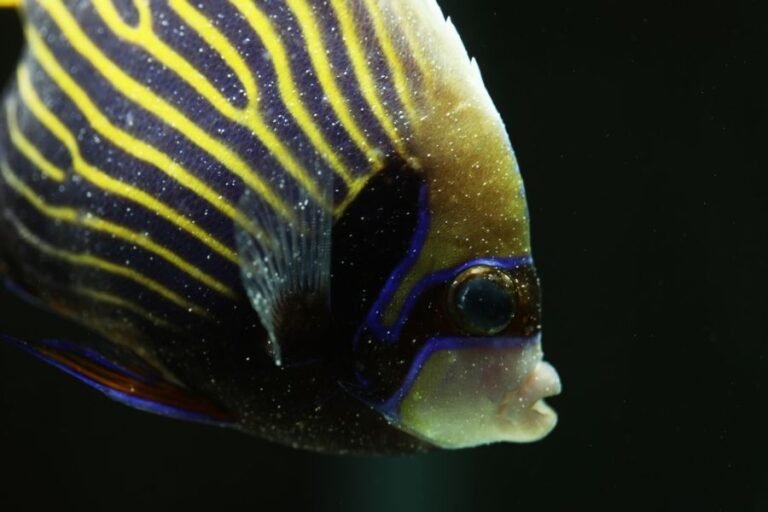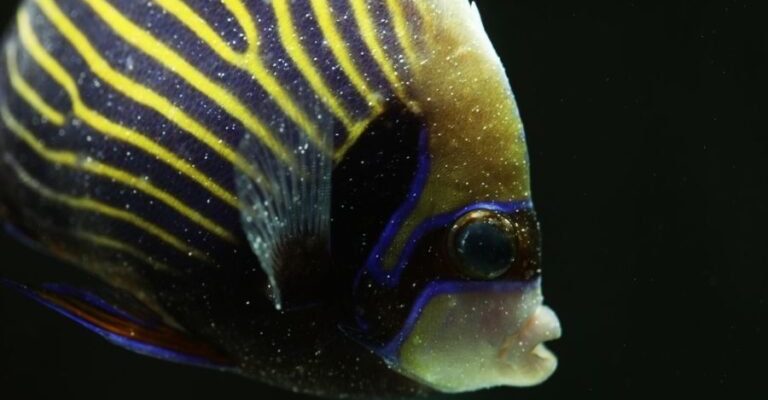
Think of it like being a guardian of an underwater kingdom. Just as you’d want to keep a castle in tip-top shape, ensuring your angelfish have a healthy environment is essential. Let’s dive into some common health problems these fish may encounter and explore ways to keep them swimming happily.
1. Ich: The White Spot Disease
Ich, short for *Ichthyophthirius multifiliis*, is a common parasite that can wreak havoc in your aquarium. Imagine tiny, white specks resembling grains of salt covering your fish—this is a sign your angelfish might have ich. It can be particularly concerning since angelfish are known for their sensitive skin and gills.
You might be wondering how this happens. Ich can enter your tank through new fish, live plants, or even equipment. If conditions aren’t ideal, like elevated stress or poor water quality, your angelfish become more susceptible. So, if you see signs like scratching against objects or a lack of appetite, it’s time to act.
Here’s how to prevent ich:
- Quarantine new fish for at least two weeks before introducing them to your main tank.
- Maintain excellent water quality by regularly testing pH, ammonia, and nitrate levels.
- Reduce stress by providing hiding spots and avoiding overcrowding.
2. Fin Rot: Signs and Solutions
Fin rot can be a real nightmare for angelfish. This condition usually presents itself as fraying or disintegration of the fins. Imagine a beautiful flag slowly tearing apart in the wind—that’s what your angelfish’s fins might look like. Fin rot can be caused by poor water conditions, injuries, or even bacterial infections.
It’s crucial to diagnose this early. If you notice your angelfish’s fins looking ragged or discolored, check your tank’s cleanliness first. Harmful bacteria thrive in dirty environments, which can lead to this condition.
To combat fin rot:
- Keep your tank clean by performing regular water changes—about 10-15% weekly.
- Monitor water parameters to ensure they’re within safe limits.
- Use aquarium salt or antibiotics as directed, but only after consulting with an expert.
3. Swim Bladder Disorder: Why Your Fish Might Sink or Float
Have you ever seen your angelfish struggling to swim upright or floating sideways? That could be swim bladder disorder. This condition affects the swim bladder, which helps fish maintain buoyancy. Think of it as a balloon—if there’s a leak, it won’t float right.
Swim bladder issues can stem from overfeeding, so if you’re tossing in food like a buffet, it’s time to rethink your serving sizes. A diet rich in fiber, such as blanched peas, can help keep their digestive system in check.
To help prevent swim bladder disorder:
- Feed appropriate amounts—a few pellets or flakes once or twice daily is usually sufficient.
- Offer a varied diet to ensure proper nutrition.
- Siphon uneaten food from the tank promptly to avoid water quality issues.
4. Velvet Disease: The Gold Dust Menace
Velvet disease, caused by the parasite *Oodinium*, can be particularly sneaky. Your fish might start to look like they’ve been sprinkled with gold dust—hence the name. The first thing you’ll notice is a change in behavior, such as hiding or rubbing against objects.
This parasite thrives in tank conditions that are less than ideal, making it crucial to act quickly if you spot it. Velvet can spread rapidly, so isolation of affected fish is necessary.
Here’s how to tackle velvet disease:
- Increase the temperature gradually to speed up the life cycle of the parasite, allowing easier treatment.
- Use specialized medications designed to combat velvet, following the instructions closely.
- Improve water quality, as clean conditions help the immune system fight back.
5. Marine Ichthyobodo: The ‘Costia’ Illness
Another concern for marine angelfish is Ichthyobodo, commonly known as Costia. This microscopic parasite causes skin and gill irritation, leading to lethargy and rapid gill movement. It can be particularly tough to spot until it’s advanced.
Stress and poor water quality can make your fish more prone to Costia. So, regular checks of your tank’s health can help you catch this before it becomes a big problem.
To prevent Ichthyobodo:
- Keep the tank temperature stable. Rapid changes can stress your fish.
- Clean your tank equipment regularly to minimize parasite spread.
- Use medications if you suspect an outbreak, consulting with a vet if necessary!
6. Stress: The Silent Killer
Stress can be an underlying factor in many health issues. Picture your angelfish in a cozy, busy restaurant. Now imagine it’s overcrowded and the workers are inattentive—that stress could lead to all sorts of problems.
Your fish can be stressed by various factors, including poor water conditions, aggressive tankmates, or even sudden changes in the environment. It’s like trying to relax in a noisy room; it just doesn’t work out!
To keep stress at bay:
- Choose tankmates wisely—compatible, peaceful species are best.
- Maintain temperature and chemical stability with regular monitoring.
- Provide plenty of hiding spots and swimming space in your aquarium.
7. Nutritional Deficiencies: Feeding Your Fish Right
Poor nutrition can lead to various issues, from weakened immune systems to stunted growth. Think of it like a diet lacking in essential nutrients—it won’t just affect health; it can influence behavior too!
Marine angelfish require a balanced diet, including high-quality pellets and frozen foods. If you’re not providing a variety, you might notice your fish becoming lethargic or displaying unusual behaviors.
To prevent nutritional deficiencies:
- Offer a varied diet of high-quality flakes, pellets, and frozen or live foods.
- Supplement with algae-based foods for essential nutrients.
- Observe your angelfish’s eating habits to ensure they’re getting enough nourishment.
In conclusion, keeping marine angelfish healthy requires attention and care. By staying informed about their common health issues and understanding how to prevent them, you can create a thriving environment where your fish feel safe and happy. It’s all about being proactive and attentive, treating your aquarium like the beautiful ecosystem it is. Happy fishkeeping!

